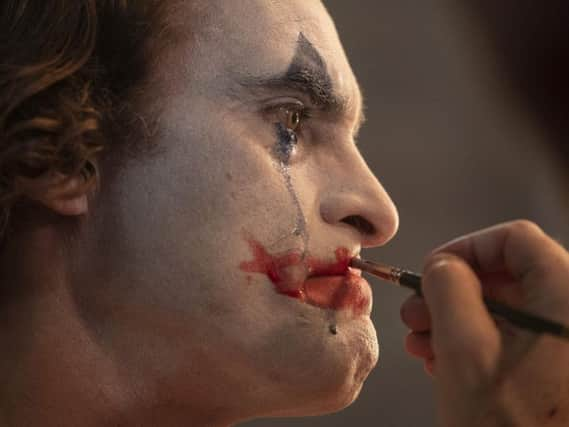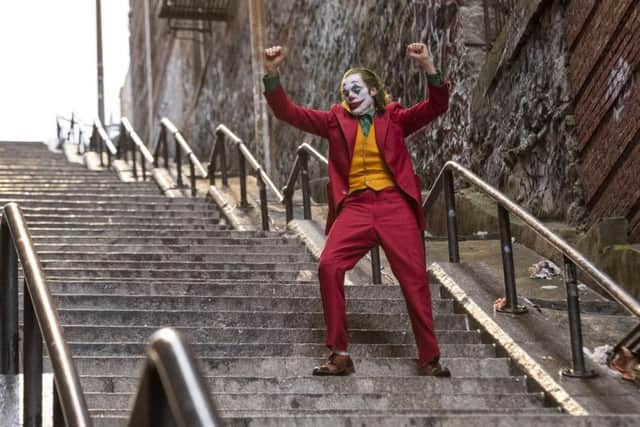Why Joker really is everything wrong with cinema today – Alastair Stewart


"I'll... see you... in Hell." Those are the final words of the Joker in The Dark Knight Returns before he breaks his own neck and frames Batman for his murder. After decades of crime, the man who laughs finally got the last laugh.
Why am I telling you this? Aside from Frank Miller's comic masterpiece being a seminal entry into the Batman lexicon, it beautifully, brutally and brilliantly concluded the time immemorial struggle between the two.
Advertisement
Hide AdAdvertisement
Hide AdGood and evil, God and the Devil, Dr Jekyll and Mr Hyde – duality and enduring, interlocking battles are at the heart of Western culture and the human condition. We're all defined in opposition to what we're not, and audiences love to flirt with the darkness without ever falling for it.


Todd Phillip's Joker desperately tries and fails to give his titular clown a solo outing. Joaquin Phoenix's Arthur Fleck exists in literal and metaphysical isolation, and yet this is neither a 'comic book film' nor a satire. It doesn't fit either world; it's more a faux homage to Taxi Driver and The King of Comedy without ever offering a skewering of the absurdities of the 1970s and 80s or a new incarnation of a classic villain.
Phoenix's portrayal as a mentally ill man who takes to a life of crime after society gives him a rough ride is nothing new. There have been economic downturns before – if a moral message was the point, why not point the finger at 2019?
Pages ripped from Library of Babel
Joker belongs on the dust heap of Hollywood barrel-scraping. The film is either a cliched character study of one of fiction's greatest villains or a failed attempt at incisive social commentary. The perpetual chatter that it's a take-down of Western avarice and Dickensian dichotomies is artisan affectation of the worst kind (and one has to ask how Robert De Niro got roped into it.
If I'm cruel, it's because Phillips could and should have made the Batman film we're all pining for. Origin stories are a busted flush, but so are two-hour pictures focussing on characters designed for ensemble interaction. We live in an age when Harley Quinn gets a Joker-less movie, a Joker movie without Batman, and a cheeky new Breaking Bad movie without Walter White. Diminishing returns and low quality are the answer to the quick-buck retreading of great ideas.
Joker, more than usual, feels like scriptwriters and studios were wandering through the Library of Babel, ripping out pages and then using Sellotape. Yes, there's Thomas Wayne and look, a young Bruce, but what are you trying to tell me? What’s the point?
If, as has been suggested elsewhere, Joker is a fresh take on mental illness, it's insulting. You’re sick, so a life of crime has to follow; post hoc ergo propter hoc? Breaking Bad spent five painstaking years achieving that unrivalled characterisation and genius.
All of this begs the question as to why Joker is hailed as a gutsy indulgence of one of pop culture's all-time most magnificent baddies. Phoenix puts in an excellent performance but, again, to what end?
Lacking in nuance
Advertisement
Hide AdAdvertisement
Hide AdIt's impossible to feel sorry for a character that has, over 80 years, raped, mutilated and murdered. Is the audience meant to forget it's embedded foreknowledge because poor Arthur Fleck was abused? Worse still, are we condemn Batman for beating down on the mentally ill as a tyrannical fascist?
Miller's comic The Dark Knight Returns – arguably one of the greatest satires of the greed, stupidity, corruption and moral hypocrisy of the 1980s – deals with this in far greater detail and complexity. The warped wrangling of Batman, the rich ‘fascist’ versus the unhinged, beat-down bad guys, is intermeshed with news reports and fickle opinions of a city which wants protection but none of the brutality required to achieve it.
Phillip's cliched script has no nuance, and nothing to say beyond those with a mental illness who encounter daily cruelty are pre-destined for a life of crime. If that's not despicable and grim, I don't know what is.
Antithesis and imagination are the crucibles from where we get our moral centre. They also require a suspension of reality that doesn't needlessly tell us a backstory best left to the imagination. Showing Hannibal Lecter as an orphaned boy or giving Darth Vader a fear of sand or making Blofeld James Bond's secret brother are unforgivable retroactions. Leave the classics, think of something new, will you?
The Joker has a myriad of origin stories which are bleak and twisted and far more than just dropping someone into acid. 'Gritty' and 'irresponsible' are adjectives bandied around as if the film has pinned up a sign-up sheet for violence. No – it's held up a mirror to anyone who finds a sad story entertaining when life is, as Hobbes said, already solitary, poor, nasty, brutish and short.
Films today plunder every facet of a famous franchise and for a fast buck and call it new. They presume audiences want to see the trees when the woods do just fine. Maybe in the post-Marvel era, I held out hope for a winged Bat at the end of Joker, alas the joke was on me.
